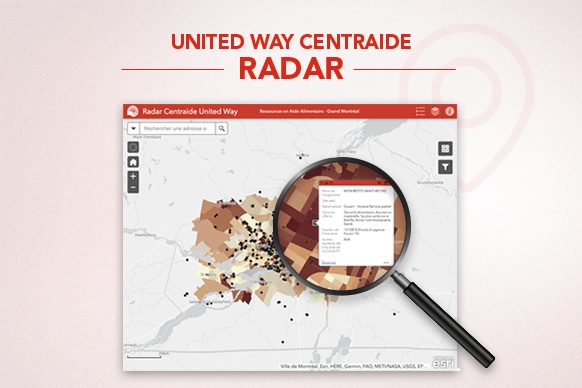Centraide of Greater Montreal launches its Radar
A digital tool to make the public aware of the needs of the vulnerable and inform the decision-making of funding partners
Montreal, May 1, 2020 — Centraide of Greater Montreal has innovated with the launch of a special COVID-19 release of its Radar, a collaborative digital tool that provides the public and local stakeholders with a map of all food assistance agencies in the Montreal Metropolitan Community that are open or closed during the crisis.
This map can be used not only to align a neighbourhood’s needs with the agencies that can meet these needs but also to effectively share information about agencies with the public, funding partners and decision-makers. Sociodemographic variables and technical features will be added as the tool is developed in order to refine analyses of issues related to poverty and social exclusion.
The Radar is a collaborative pan-Canadian project led jointly by Centraide of Greater Montreal, United Way Calgary and Area, and United Way Greater Toronto. It is the first in a series of technological innovations developed over the past two years by Centraide United Way to support the digital transformation of the social, community and philanthropic sectors. The tool allows professionals and stakeholders in these sectors as well as other funding partners to get a broad view of social issues and the agencies that work on them so that they can align and optimize their financial support.
The Radar stands out because it combines information from the following sources:
- Data from 211, an information and referral service that keeps a current database of all agencies in the field.
- The latest sociodemographic data from Statistics Canada and Environics at different scales (neighbourhoods, towns, cities, RCMs, etc.)
- Money given to agencies by all funding partners.
“Our goal is to collect information and make it accessible to everyone, particularly to our partners and social and community stakeholders. The Radar will give us a better idea of funding gaps and help us adjust our investments to meet priority needs. For example, we can identify neighbourhoods where few services are available despite high demand and significant poverty rates,” said Lili-Anna Pereša, President and Executive Director of Centraide of Greater Montreal.
The COVID-19 Radar emphasizes food security agencies, which have experienced a sharp increase in demand since the start of the health crisis. Agencies that work on other social issues, such as housing, mental health, and the academic success of young people, will be gradually added to future versions of the Radar. Data from other major Canadian cities, such as Calgary, Toronto and Vancouver, will be available soon. Information for all of Quebec will be released as soon as the 211 service is available in all regions.
This first release of the Radar was made possible thanks to financial support from the Lucie and André Chagnon Foundation. It was developed with the generous collaboration of Esri Canada, a company that provides geographic information system solutions.
Centraide of Greater Montreal is also proud to have had the support of the following organizations in this project so far:
- Borough of Montréal-Nord
- Breakfast Club of Canada
- Pathy Family Foundation
- Foundation of Greater Montreal
- Lucie and André Chagnon Foundation
- McConnell Foundation
The special COVID-19 Radar is publicly available at https://www.centraide-mtl.org/en/covid-19-response/united-way-centraide-radar.
Centraide of Greater Montreal is active in the territories of Laval, Montreal and the South Shore. Vulnerable people who don’t know where to turn for help can call 211 or visit 211qc.ca for referrals to the best resources for their needs. For more information, visitcentraide-mtl.org, follow us on social media (Facebook, Twitter and LinkedIn) or subscribe to our newsletter.



